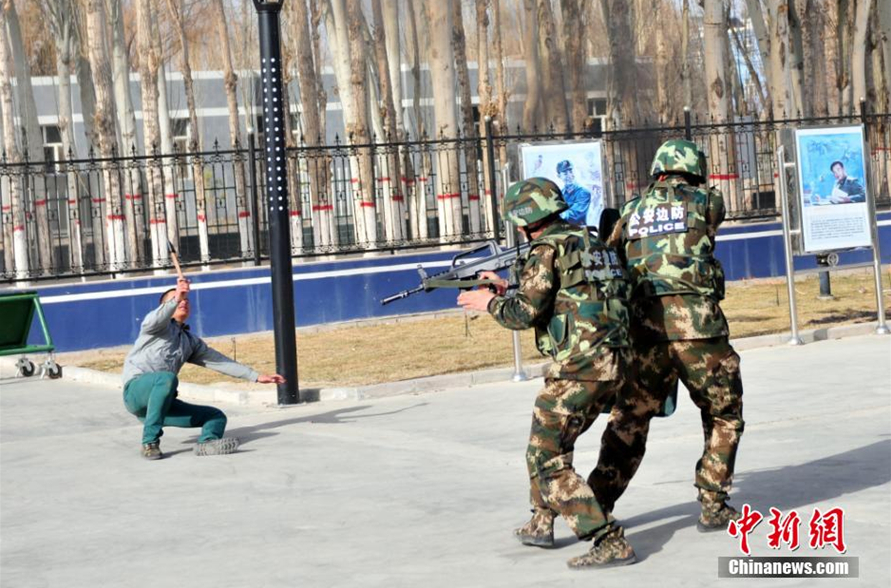|
 |
| Police attending an anti-terror drill aim at a suspect at a border police station Xinjiang in this April, 2014 file photo. [Photo/Chinanews.com] |
Tough measures are needed to curb the spread of religious extremism via multimedia platforms in the Xinjiang Uygur autonomous region, an official from the Xinjiang High People's Court said on Wednesday.
Such extremism can lead to terrorist activities and seriously threaten social stability, said Aniwar Abudulreyim, presiding judge of the first criminal court of the region's high court.
"The contents of religious extremism related to video and audio twist the doctrine of the Quran, the holy book of Islam, and promote 'holy war', which aims to carry out terrorist attacks. We've even seen suspects publishing footage of women and children participating in terrorist training to encourage them to join terrorist cells," he said.
Some of the extremist audiovisual files include information that instigates ethnic hatred and teaches others how to carry out terrorist attacks as well as make weapons, he said.
Thirty-nine people in the region have been found guilty of crimes that include spreading religious extremism or terrorism via mobile devices or the Internet, the court said on Wednesday at a news conference in Urumqi, the region's capital.
The criminals face up to 15 years' imprisonment.
The convicts involved in 16 cases were tried in six prefectures, including southern Xinjiang's Aksu and Hotan, on Tuesday. They were convicted of charges of organizing, leading and participating in terrorist groups, instigating ethnic hatred and illegally producing guns.
"I want to clarify that those who join terrorist groups without knowing their nature and withdraw from the organizations immediately after they find out the truth will not be considered as participating in terrorist groups. Meanwhile, those who continue to stay in the groups despite realizing their extreme intentions will be punished under the law," Aniwar said.
The trials came less than two months after the regional authorities, including the high court, people's procuratorate and public security bureau, jointly issued a warning to people that editing, broadcasting or keeping audio or video files that incite violence and terrorism will be punished under the law.
The authorities also listed the means of transmission of these illegal products as websites, micro-blog accounts, voice-chat rooms, popular online social networking tool QQ, and mobile social-media applications such as WeChat. The transportation or mailing of such material is also forbidden.
Since the announcement was published, public security forces in Xinjiang have handled more than 226 cases in which the Internet or cellphones were used to carry out crimes involving religious extremism. About 232 people have been charged or investigated.
Zhang Chunxian, top leader of the region, said in March that social media and the Internet have become another battleground in its fight against terrorism.
Yu Huitang, spokesman for the region's high court, said that the suspects in the latest cases listened or watched terrorist-related audio or video files, many of which were uploaded to the Internet abroad and downloaded to digital storage devices.
In one case, Ibulayin Turson, a member of a terrorist cell led by Kasmu Pulat, had been promoting "holy war" and sent the pictures of terrorists to others via QQ. He was jailed 10 years for participating in a terrorist group. Kasmu Pulat himself was jailed 15 years for organizing the members to conduct physical training to prepare for "holy war" from April to June 2013.
Aniwar said he hopes releasing the details of the cases will help people understand the seriousness of spreading religious extremism or terrorism.
Zhao Lili, an associate professor at Xinjiang University of Finance and Economics, echoed Aniwar's sentiments. "Many of the convicted suspects are young with little education and are unemployed. Authorities need to make a priority of educating people about the law, especially young people."
